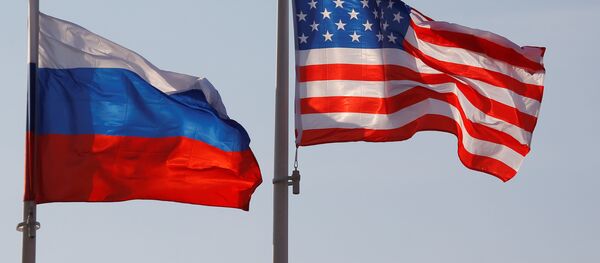White House spokeswoman Sarah Huckabee Sanders, for her part, said that "right now we're reviewing our options, and when we have something to say on it, we'll let you know," according to the Washington Post newspaper.
Six days after the US House of Representatives approved an anti-Russian sanctions package on July 24, Russian President Vladimir Putin announced that the diplomatic presence of the United States in Russia would be cut by 755 people to 455, the same number of diplomatic personnel that Russia currently has in the US.
US new anti-Russian sanctions point a dagger at the heart of Europe https://t.co/vgpNjJQFVW pic.twitter.com/5WkzaLb5e7
— johnpete10 (@johnpete1010) 30 июля 2017 г.
In an interview with Russia's Rossiya 1 TV channel, Putin explained why Moscow had responded to the US sanctions bill.
"The US side again undertook an unprovoked — which is very important — step toward the deterioration of Russian-American relations: on illegal restrictions, on an attempt to influence other countries of the world, including its allies who are interested in developing and maintaining relations with Russia," he said.
He added that "we waited for quite some time that maybe something would change for the better, had such hope, that the situation will somehow change, but, apparently, if it changes, it [won't happen] so soon."
Speaking to Sputnik, expert Dmitry Ofitserov-Belsky of the Moscow-based Higher School of Economics described the Kremlin cutting the US diplomatic presence in Russia as a completely justified decision.
"Russia had to show that firstly, it was ready to respond and secondly, that if the US offers a scenario where the conflict escalates, Russia is able to survive this tension and does not agree to surrender," Ofitserov-Belsky said.
"In the long run, Moscow's statement on the expulsion of American diplomats and embassy workers, in fact, means that Russia can do without relations with the US on a whole array of issues," according to him.
"This measure is not discriminatory and it does not violate any aspects of our [Russian-US] relations. It's just a freezing measure, something that adds to its demonstrative goal," he added.
According to the expert, the US in its actions is guided primarily by its own economic interests, which is once again confirmed by the new anti-Russian sanctions bill.
"Regardless of which part of the elite is currently in power in the United States, there is little change in the situation so you should neither be angry with the Americans over the policy they are pursuing nor harbor any illusions," Ofitserov-Belsky said.
"The new sanctions are expected to be used against Russian energy companies in order to block the strengthening of Russia's positions in the European energy market. I mean, first of all, the Nord Stream 2 [gas pipeline project]," he added.
On Monday, Vice President Mike Pence said Trump will soon sign into law the new legislation that enhances US sanctions against Russia. It was approved by overwhelming majorities of 419 to 3 in the House of Representatives and by 98 to two in the Senate.





